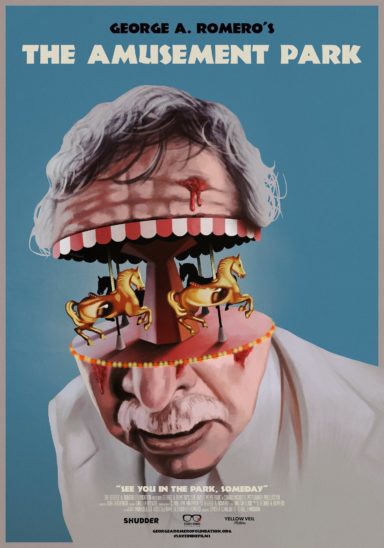 Yes, this is the now-famous “lost” 1973 film by the late George A. Romero, a 54 minute mini-feature about society’s treatment of the elderly. Commissioned by the Lutheran Service Society of Western Pennsylvania as a dramatic PSA, it was filmed in three days at the late West View Amusement Park with many of Romero’s standard crew members (such as associate producer Richard P. Rubinstein and actor/cinematographer S. William Hinzman). Romero, alas, apparently did his job a bit too well, as the film was suppressed until 2017, when a 16mm copy was located.
Yes, this is the now-famous “lost” 1973 film by the late George A. Romero, a 54 minute mini-feature about society’s treatment of the elderly. Commissioned by the Lutheran Service Society of Western Pennsylvania as a dramatic PSA, it was filmed in three days at the late West View Amusement Park with many of Romero’s standard crew members (such as associate producer Richard P. Rubinstein and actor/cinematographer S. William Hinzman). Romero, alas, apparently did his job a bit too well, as the film was suppressed until 2017, when a 16mm copy was located.
Romero himself was dismissive of the film, claiming it was “a community thing. It was nothing.” His widow Suzanne Desrocher-Romero felt differently, and instituted the George A. Romero Foundation, whose inaugural project was the restoration of THE AMUSEMENT PARK. The film wound up premiering on Shudder on June 8, 2021.
It begins with a monologue by the 70 year old lead actor Lincoln Maazel (who’d go to play a key role in Romero’s MARTIN), who proclaims that “perhaps the saddest cause of denial and rejection is, very simply, old age…The older citizens of the world represent a much misused natural resource. The wasting of this great resource is a worldwide tragedy.”
Next we see a bruised and bloodied Maazel slumped in an unnerving all-white room. A more hopeful version of himself enters the room to ask what it’s like outside, only to be sternly warned off going out by his out-of-breath companion. Maazel goes out anyway, and finds himself, clad in an all-white suit and tie, in a crowded amusement park, where his first encounter is with a rude ticket-taker.
He boards a roller coaster with an absurd set of prohibitions (with signs like “Must Have Individual Income Over 3,500” and “Must Not Fear the Unknown”). A bumper car collision mimics an actual roadside altercation, with an elderly couple getting verbally abused by a younger driver (played by Romero himself) and Maazel, who witnesses the accident, treated quite dismissively by a traffic cop. Things aren’t much better at a carnival market, where no one is willing to help Maazel with his groceries, and a merry-go-round, where he’s branded a pedophile for interacting with some kids. Even a “Senior Citizens Preferred” area of the park, which functions as a vast nursing home, isn’t much fun.
A visit to an oracle is especially awful, with a young couple getting a glimpse of their future that’s downright horrific–so much so that the young man, whose lonely death has been foreseen, blindly assaults Maazel. Another assault follows, by bikers who knock him to the ground and empty out his pockets. A subsequent visit to a first aid station, and an encounter with a little girl, further the unpleasantness until Maazel, now a bloody mess, once again enters the white room where everything began.
A lost masterpiece? Not quite. The film’s amusement park-as-life metaphor is obvious and overwrought, and the constant viewpoint shifts are needlessly confusing. The wrap-up, in which Maazel explains to the audience the significance of the final scene, is unnecessary (the film is pedantic enough without it), and the quintessentially seventies score, decked out with whirs and beeps, is a constant distraction.
But the film hits its mark. Maazel is effective (even if his role consists mostly of horrified and appalled reactions) and well complimented by the highly expressionistic camerawork, distorted lenses and subtly unnerving crowd placement (with unseen individuals constantly crossing the frame in the fore and background). The horrors of old age have never been presented more forcefully than they are here, in a sustained nightmare that’s all the more affecting because, as Maazel warns us upfront, “Remember as you watch the film: one day you too will be old.”
Vital Statistics
THE AMUSEMENT PARK
Shudder/Yellow Veil Pictures
Director: George A. Romero
Producer: Richard P. Rubinstein
Screenplay: Walton Cook
Cinematography: S. William Hinzman
Editing: George A. Romero
Cast: Lincoln Maazel, Harry Albacker, Phyllis Casterwiler, Pete Chovan, Marion Cook, Walton Cook, Sally Erwin, Michael Gornick, Jack Gottleb, Virginia Greenwald, Bonnie Hinzman, S. William Hinzman, Halem Joseph, Bob Koppler, Sarah Kurtz, Aleen Palmer, Georgia Palmer, George Romero, Arthur Schwerin, Bill Siebart, Bob Trow, Gabriel Verbick, Jewel Walker
